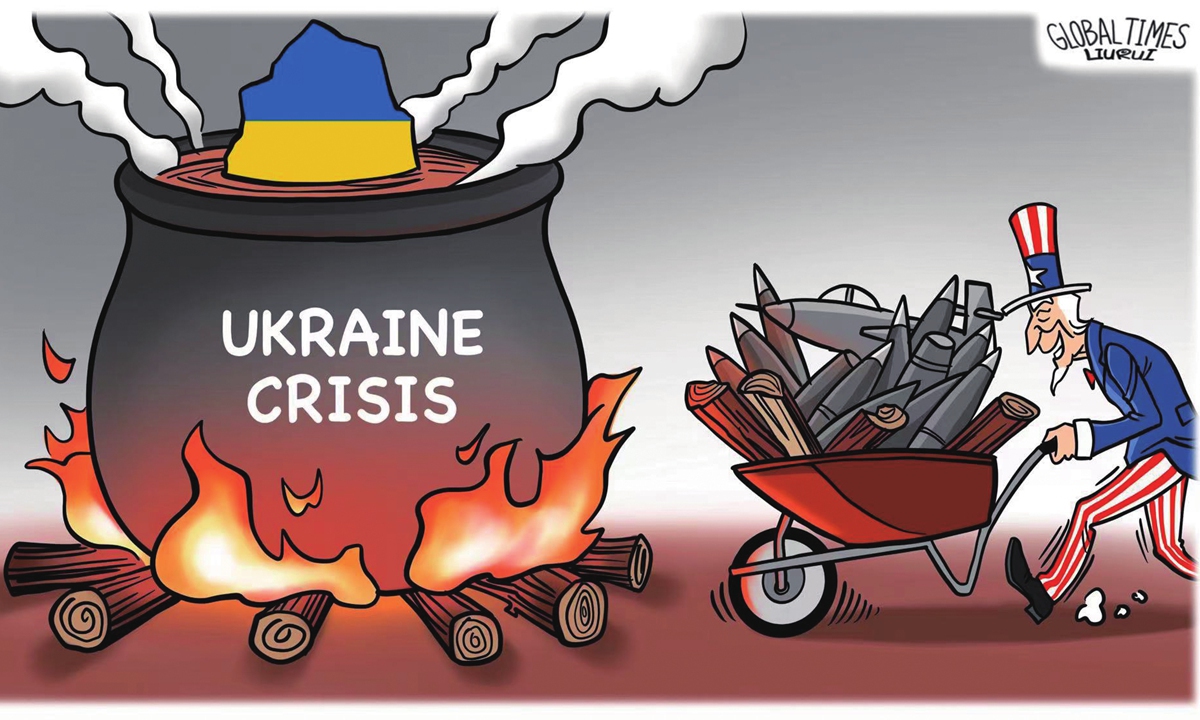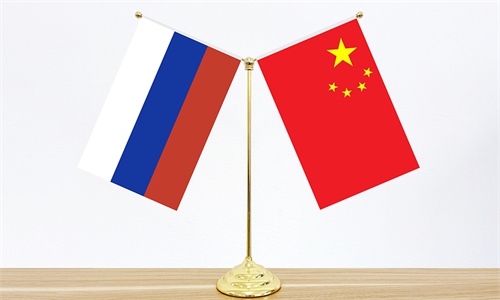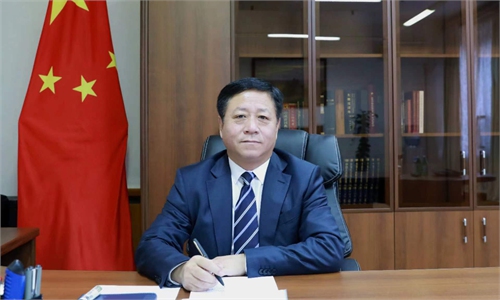US rejecting calls for Ukraine ceasefire shows ulterior motive of fueling the fire of conflict

Illustration: Liu Rui/GT
The US rejecting calls for a ceasefire in Ukraine ahead of the meeting of Chinese and Russian leaders again showed its ulterior motive of fueling the fire of conflict and using Ukraine as its pawn to geopolitically weaken Russia to the maximum level, Chinese experts said, who also pointed out the sharp contrast between Washington and Beijing, with the latter always seeking peace and dialogue on the matter.
China announced on Friday that President Xi Jinping will pay a state visit to Russia from Monday to Wednesday.The visit is widely considered a journey that will advance peace as China has been long committed to promoting peace and dialogue over the Russia-Ukraine conflict. However, the Biden administration threw mud over the trip, expressing concerns over any proposals from China and claiming any framework offered by Beijing "would be one-sided and reflect only the Russian perspective."
John Kirby, spokesperson for the US National Security Council, told reporters ahead of Xi's planned trip to Russia next week, that "We don't support calls for a ceasefire right now." He said a proposal from China could include some type of ceasefire, which would merely be a way for Russia to regroup before launching a reprisal, CNN reported on Friday. "A ceasefire now is effectively the ratification of Russian conquest," Kirby said.
The US also views the China-proposed position paper on the political settlement of the Ukraine crisis with "deep skepticism," and Kirby said "we do not believe that this is a step toward a just and durable peace."
"The US rejects any effort that is conducive to easing the situation, as it always hopes to escalate the tension and use Ukraine as a pawn to weaken Russia. The US wants to punish Russia in a ruthless and uncompromising way," Li Haidong, a professor at the Institute of International Relations at the China Foreign Affairs University, told the Global Times on Saturday.
Such zero-sum mentality and "winner-or-loser" geopolitical game between major powers is extremely dangerous not only to Russia, Ukraine and Europe, but also to the world, Li said.
In contrast, Xi's upcoming visit to Russia, viewed as a trip of friendship, cooperation and peace, is expected to further promote China-Russia cooperation and contribute to global peace and development. Especially after China brokered a deal between Saudi Arabia and Iran recently, many observers raised expectations for whether China will play a crucial role in political settlement in the Ukraine crisis when Beijing has open communication channels with both countries.
On Thursday, Chinese Foreign Minister Qin Gang told his Ukrainian counterpart Dmytro Kuleba that China is very concerned about potential escalation of the Ukraine crisis, and hopes talks can be resumed as soon as possible to promote a political solution.
Some experts said any possibility for China to mediate the Russia-Ukraine conflict could not be ruled out as the global community has been anticipating China's constructive role in global and regional conflicts.
"The US looks at the world differently than Moscow and Beijing. For them, prosperity depends on hegemony, and all practical policy must support this fundamental goal. Therefore, the West's most important tool is pressure, and China and Russia's most significant tool is cooperation," Timofei Bordachev, Moscow-based Valdai Club program director, told the Global Times.
The China-Russia partnership is not directed against anyone else in the world - it is not an instrument of war, but the instrument of peace, Bordachev said.
China-Russia comprehensive strategic partnership of coordination for a new era is conducive to helping maintain the global security, stability and helping tackle pressing security and economic issues, which has great significance to the world. China-Russia relations - setting a good example for international relations - won't be kidnapped by the US-led West, experts said.
"Badmouthing China's role in promoting peace in the Ukraine crisis is because China's possible efforts would interrupt the US' long-term plan to weaken Russia and control the Europe," Cui Heng, an assistant research fellow from the Center for Russian Studies of East China Normal University, told the Global Times on Saturday. "Also, China's role in promoting peace talks also shows the country rising influence as major power, a development that the US cannot accept," Cui said.
Even though the US does not accept the fact that China is gaining power and influence on the global stage, it has to face the fact that the upcoming visit of China's top leader to Russia is widely expected to contribute to the peaceful settlement of the Ukraine crisis and will help advance all-out practical cooperation between China and Russia.



